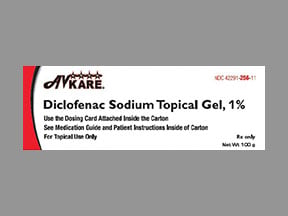
Goodsense Arthritis Pain Coupons & Savings Card – Discount Prices from $9.65
Brand for: Acetaminophen er
My prescription
Edit
100GM of 1%, Diclofenac Sodium (1 Tube)
Select pharmacy

Albertsons
$9.65
COUPON PRICE
Walgreens
$10.99
COUPON PRICE
Walmart
$19.56
COUPON PRICEGoodsense Arthritis Pain savings card
Show this card to your pharmacist
Albertsons
$9.65
BIN
ID
PCN
GRP
019876
LHEEBEDA74
CHIPPO
LHX
Powered by
More prescriptions for rheumatoid arthritis
More prescriptions for rheumatoid arthritis
Price history for Goodsense Arthritis Pain (brand) & Diclofenac Sodium (generic)
1 Tube, 100GM
Average retail price for Goodsense Arthritis Pain
Average retail price for Diclofenac Sodium
Average SaveHealth price for Diclofenac Sodium
Our price history data is based on aggregated prescription data collected from participating pharmacies in America. Our prescription data updates daily to reflect the latest price changes. If you notice a missing data point, it means there wasn't sufficient data available to generate a monetary value for that date.
Over the last 12 months, the average discount price of Goodsense Arthritis Pain is $13.22 using the SaveHealth savings card. That's an average savings of 57.98% on Goodsense Arthritis Pain with our discount card.
*Retail prices are based on pharmacy claims data, and may not be accurate when we don't have enough claims.
Goodsense Arthritis Pain (Diclofenac Sodium) dosage forms
Dosage Quantity Price from Per unit 100GM 1 Tube $9.65 $9.65 100GM 2 Tubes $11.80 $5.90 100GM 3 Tubes $13.95 $4.65 100GM 4 Tubes $16.10 $4.03 100GM 5 Tubes $18.26 $3.65
| Dosage | Quantity | Price from | Per unit |
|---|---|---|---|
| 100GM | 1 Tube | $9.65 | $9.65 |
| 100GM | 2 Tubes | $11.80 | $5.90 |
| 100GM | 3 Tubes | $13.95 | $4.65 |
| 100GM | 4 Tubes | $16.10 | $4.03 |
| 100GM | 5 Tubes | $18.26 | $3.65 |
Goodsense Arthritis Pain Warnings
Acetaminophen is a widely used medication, but it is important to use it safely to avoid serious health risks. The following guidelines are essential to ensure its safe usage:
Dosage Limits: Adults should not exceed a daily intake of 4000 milligrams (4 grams) of acetaminophen. Individuals with liver issues and children should consult a healthcare provider to determine a safe dosage.
Drug Interactions: Avoid taking other medications containing acetaminophen without professional consultation. This compound is often found in both prescription and over-the-counter products, such as pain relief and cold medications. Always check the labels, and if uncertain, seek advice from a pharmacist.
Overdose Symptoms and Actions: If an overdose is suspected, even if no symptoms are present, seek immediate medical assistance. Symptoms of an overdose may include nausea, vomiting, loss of appetite, sweating, abdominal pain, severe fatigue, yellowing of the skin or eyes, and dark urine.
Alcohol Consumption: Regular alcohol consumption can increase the risk of liver damage when taking acetaminophen. It is advisable to avoid alcohol while using this medication.
By adhering to these precautions, you can minimize the risks associated with acetaminophen and ensure its effective and safe use. Always consult healthcare professionals with any concerns or questions regarding your medication regimen.
Goodsense Arthritis Pain Side Effects
This medication is generally well-tolerated, with most people experiencing no side effects. However, if you experience any unusual effects, it is important to contact a healthcare professional promptly. Serious side effects are uncommon, and the benefits of this medication often outweigh the risks of any potential side effects. A very serious allergic reaction to this medication is rare, but it is crucial to seek immediate medical attention if you experience symptoms such as a rash, itching or swelling, particularly of the face, tongue, or throat, severe dizziness, or difficulty breathing. These symptoms could indicate a severe allergic reaction that requires urgent care. While this list is not exhaustive, any other unlisted effects should also be reported to a healthcare provider. Staying informed and vigilant about any changes in your health while taking this medication is important for your safety and well-being.
Goodsense Arthritis Pain Interactions
Using the SaveHealth discount card, what is the price of Goodsense Arthritis Pain without insurance?
Using the SaveHealth discount card, the price of Goodsense Arthritis Pain without insurance is $9.65.
What is the price of Goodsense Arthritis Pain at Walgreens?
The price of Goodsense Arthritis Pain at Walgreens is $10.99.
What is the price of Goodsense Arthritis Pain at Walmart?
The price of Goodsense Arthritis Pain at Walmart is $19.56.
